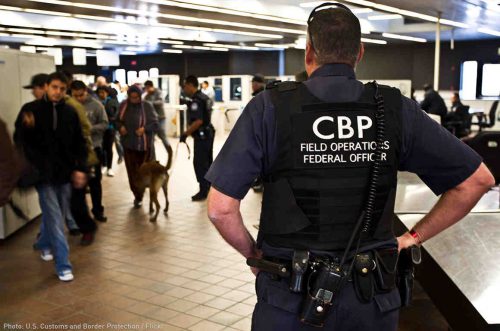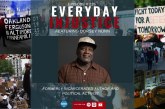
(From Press Release) – American Civil Liberties Union affiliates across the country filed coordinated Freedom of Information Act lawsuits today demanding government documents about the on-the-ground implementation of President Trump’s Muslim bans. The ACLU of Northern California, the ACLU of Hawai’i, and the ACLU of Utah jointly filed a FOIA lawsuit on Monday. Davis Wright Tremaine LLP is co-counsel in the lawsuit.
Today’s action is part of a total of 13 FOIA lawsuits filed by ACLU affiliates.
The ACLU of Northern California lawsuit is seeking records from U.S. Customs and Border Protection’s San Francisco Field Office. In particular, the lawsuit seeks records related to CBP’s implementation of President Trump’s Muslim bans at Honolulu International Airport, Kona International Airport, Salt Lake City International Airport, San Francisco International Airport, and San Jose International Airport.
The ACLU first sought this information through FOIA requests submitted to CBP on February 2. Since the government has failed to substantively respond, the ACLU is now suing.
“The public turned out out en masse at airports, including San Francisco International Airport, to protest the Muslim ban and hold the government accountable,” said Linda Lye, Senior Staff Attorney with the ACLU of Northern California. “The public has a right to know how CBP implemented and enforced these Executive Orders at airports here and across the country.”
“CBP has a long history of ignoring its obligations under the federal Freedom of Information Act — a law that was enacted to ensure that Americans have timely access to information of pressing public concern. The public has a right to know how federal immigration officials have handled the implementation of the Muslim bans, especially after multiple federal courts have blocked various aspects of these executive orders,” said Mitra Ebadolahi, Border Litigation Project Staff Attorney with the ACLU of San Diego and Imperial Counties.
Each lawsuit seeks unique and local information regarding how CBP implemented the executive orders at specific airports and ports of entry in the midst of rapidly developing and sometimes conflicting government guidance.
The coordinated lawsuits seek information from the following local CBP offices:
Atlanta
Baltimore
Boston
Chicago
Detroit
Houston
Los Angeles
Miami
Portland
San Diego
San Francisco
Seattle
Tampa
Tucson
The complaint can be found here:
https://www.aclunc.org/sites/default/files/04122017_NorCal_FOIA_Complaint.pdf
All of the affiliate FOIA lawsuits will be available here:
https://www.aclu.org/other/aclu-cbp-foia-lawsuits-regarding-muslim-ban-implementation
The ACLU national release is here:
https://www.aclu.org/news/aclu-files-lawsuits-demanding-local-documents-implementation-trump-muslim-ban
The ACLU national release on the original FOIA requests is here:
https://www.aclu.org/news/aclu-files-demands-documents-implementation-trumps-muslim-ban
More background on CBP’s FOIA practices is here:
https://www.aclu.org/letter/aclu-letter-cbp-re-foia-practices-july-2016
You Have a Right to Know How Trump’s Muslim Ban Was Implemented. So We Sued
By Thaddeus Talbot
Extensive questions surround the chaos that erupted nationwide in response to President Trump’s first “Muslim ban.” Because the government has refused to hand over information that would allow the public to evaluate how the ban was implemented, ACLU affiliates have filed dozens of lawsuits around the country to demand details.
On January 27, President Trump signed Executive Order 13769, indefinitely blocking refugees from Syria from entering the United States, barring all refugees from resettlement for 120 days, and prohibiting nationals of seven predominantly Muslim countries from entering the United States for 90 days.
Chaos immediately erupted at airports, courtrooms, and political offices around the country. Dozens of refugees and travelers were detained with little to no explanation, denied access to lawyers, and in some cases put on return flights back to harm’s way.
As this crisis unfolded, U.S. Customs and Border Protection and the Department of Homeland Security issued contradictory statements, fueling mass confusion. The agencies claim that they, too, were left in the dark by the Trump administration. Reports confirmed that DHS Secretary John Kelly hadn’t even seen the final version of the Muslim ban until after the executive order was signed.
DHS’s attempts to clarify the terms of the ban nationally only perpetuated the confusion. On Saturday, January 28, DHS declared that green card holders were subject to the ban; by Sunday, January 29, government officials had “clarified” that the Executive Order did not apply to green card holders. Unsurprisingly, CBP’s local implementation of the Muslim ban in different international airports varied widely: While some agents aggressively tried to strip travelers of green cards, others hesitated, unsure which travelers were to be permitted entry and which were to be refused.
Perhaps most troubling, CBP officers apparently ignored the express terms of several federal court orders blocking certain parts of the Muslim ban. At Dulles airport, for example, Democratic members of the House of Representatives had to demand that refugee detainees subject to Trump’s ban be released. Similarly, when refugee advocates at JFK airport asked why the court orders that blocked the ban from taking place weren’t being enforced, some CBP officers replied: “Call Donald Trump.”
This confusion had serious human impacts. In Texas, a 33-year old Iraqi man in a wheelchair was detained for 15 hours after traveling to Dallas Fort Worth airport on a Special Immigrant Visa that was awarded to him because of his work with the U.S. Army. In Virginia, Yemeni individuals flying to Dulles when the first executive order took effect had their visas revoked upon landing and were required to fly back to Ethiopia. In New York, two doctors from Cleveland were subjected to extensive delays, detention, and distress at JFK airport after returning from vacation in Iran.
To clarify the public’s understanding of these urgent developments, 50 ACLU affiliates filed Freedom of Information Act requests on February 2. Yet more than two months later, neither DHS nor CBP has provided us with any information about their local implementation of the executive order.
FOIA’s purpose is to ensure that people have timely access to crucial government information. The public has a right to know how CBP officers have implemented the Muslim ban locally. We deserve to have access to that information now.
Dozens of ACLU affiliates across the country filed coordinated lawsuits yesterday demanding responses to our FOIA requests. Each lawsuit seeks unique, local information from CBP field offices, to clarify the public’s understanding of how CBP officers in each jurisdiction implemented the Muslim ban in the face of rapidly evolving and sometimes conflicting national guidance.
Democracy withers without government accountability, and accountability requires transparency. The government has a duty to keep the American people informed. This is particularly true for agencies like CBP, which have terrible transparency track records and feel empowered to upend the lives of immigrants and refugees with impunity. Stay tuned.






Thanks for posting this article. Some of my acquaintances have expressed a lack of concern about this policy largely focusing on the temporary nature of the 90 day period. But I had a large number of both patients and colleagues whose family members live in the targeted countries and who were and would be strongly affected by this ban. One example. A doctor significantly delayed in return may have adverse consequences for both her patients and her colleagues. A second and common circumstance in my speciality. For many cultures, it is an extremely important part of childbirth that a female relative, usually the woman’s mother or step mother be present for the birth of a child and for the care of the woman for the first 40 days after a delivery. Depriving a family of this culturally critical support, while it does not sound like much to many of us, can have profoundly negative impacts on families.
This was not a benign, or merely inconvenient step and the public has every right to know how it was being enacted.